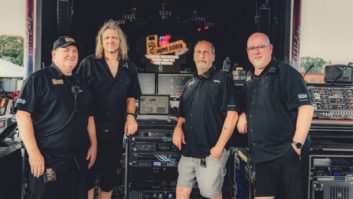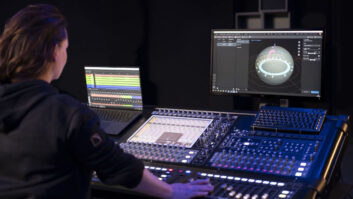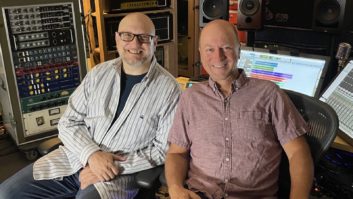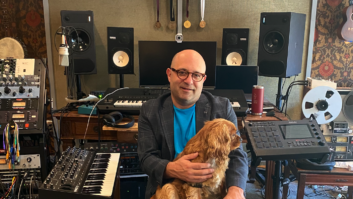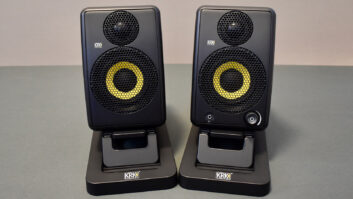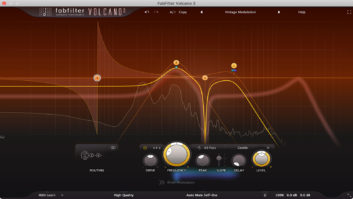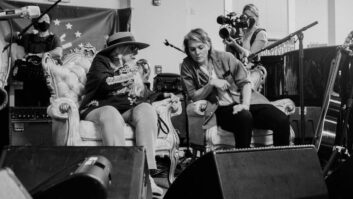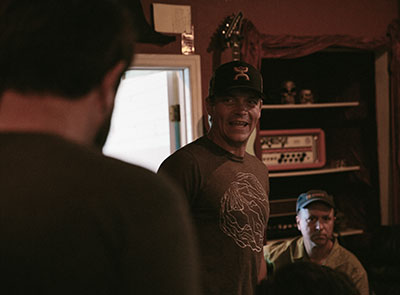
Us and The Night (Republic Records) marks the sixth release of new material for 3 Doors Down. This time out the band was joined by producer/engineer Matt Wallace, who has had a long string of success over the past 25 years, producing and engineering acts including Maroon 5, Faith No More, O.A.R., Spin Doctors, Train and Blues Traveler, among many others.
Tracking took place at Blackbird Studios in Nashville, but before recording, he and the band addressed the songs. “Typical of 3DD and most bands that I work with, they had a big pile of songs,” Wallace begins. “My job as a producer is to help them find the better songs. We went through all of them, seeing if the chords supported what Brad [Arnold, lead vocalist] was trying to do melodically, and whether we had the right key and the right tempo. Working on more songs than you know you’ll ultimately record can be a challenging, frustrating process but you have to go through it because you don’t always know which ones will come to the forefront. Sometimes you work on a song that you weren’t sure about, and it comes together.
“In fact, the song ‘In The Dark’ [the first single] came around at the last minute,” he continues. “Chet [Roberts, guitar] recorded the demo on his iPhone. He played it to us and we ran with it. They happened to be filming for another song, ‘The Broken,’ and captured some of the work on ‘In The Dark.’ There’s a short video [on YouTube] showing how that song came together and how we worked through it. That was one of those times when a last-minute idea becomes a song that you use for the record.
“It’s very easy for anyone, myself included, to hear a nice polished demo and think it’s a better song,” Wallace continues. “To level the playing field we have to do away with that. Our starting point is, ‘Do we have a good song on an acoustic guitar?’ It always comes down to ‘why choose this song over other songs?’ And generally, with most singers, certainly with Brad, there’s emotional or life moments that relate to those reasons. I want to make sure that everything we do supports Brad, creating a platform for him to do his thing. We can’t step on his vocal.”
Wallace and the band recorded drums and bass in one week at Blackbird and did another week of overdubs in one of the smaller rooms. “At the tracking sessions,” Wallace explains, “we had everything going: drums, bass, guitars and, at times, keyboards, as well. Capturing that all together, with Chris [Henderson] and Chet on guitar, and Justin Biltonen on bass, really adds to the energy in the room and it comes forth when you hear the drums. I think it’s an essential way to get the foundational aspects of the recording. You can pick and choose what you want to keep or overdub as needed, but invariably it makes the drummer—in this case Greg Upchurch—step up and do his best work.
“Then we went to the band’s studio [Rivergate] in Hendersonville for overdubs and vocals. We recorded Brad’s rough vocals at the tracking sessions, but weren’t really focusing on vocals while tracking. It’s better for me to have one-on-one time with a singer, talk about what the song means and what he is trying to get across. It’s very difficult to pull that off when you are producing and engineering a tracking session.”

L to R: Matt Wallace, bassist Justin Biltonen and Brad Arnold
Having said that, Wallace reveals his approach to recording Arnold’s vocals: “I helped the band put together a secondary Pro Tools room at their studio so that Chet could work in that room on keyboard parts. Meanwhile, I was in the main room with Brad doing vocals. Most singers tend to feel better when they don’t have a lot of people around, especially if you are trying to dig into some deeper emotional content.
“Generally we’d roll along with overdubs until Brad felt ready to sing a song or a group of songs,” he explains. “I’d get the vocal room set and get the headphone mix ready. Sometimes he’d come in, sing a song, get warmed up and do two or three more. Other times his voice was not as strong as he wanted so we’d come back the next day. That part of the project was very much built around when Brad felt ready to sing, as vocalists are the most challenging of musicians to record because they have an instrument that’s integral to their body, tied to them in a physical way. They have to feel healthy and well-rested. You try to capture those moments when you can. If a singer has a cold or is just not up for it, they’re simply not going to do their best work.
“I prefer that a vocalist sing the song a few times to get a performance, and Brad is that type of singer. Sometimes if it’s a new song that’s still kind of being written, we’d focus on the verses and see how it comes together, but generally I prefer long takes. Usually one take is really good and we can composite any moments that were superior from other takes.”
Asked about the vocal recording chain, Wallace’s answer is a bit surprising: “This is an interesting area where I might part ways with other engineers. I’m a big fan of good gear and have certainly owned my share of expensive vintage stuff. But I firmly believe that what you record is more important than how you record. When there’s drums, voice or guitar, 85 percent of the sound is coming from the musician, and we try to capture the remaining 15 percent. Brad is a great singer. We rented a Neve 1073 and a microphone—probably a Neumann U 47 or U 67, I’m not even sure to be honest—but it’s really down to the singer. I’ve had great luck with people holding an SM58 in the control room.”
When the recording process was finished, the sessions were sent to Chris Lord-Alge for mixing. “3DD has worked with Chris in the past and he just does such a great job that it made sense to get him on board. He nailed it as he usually does. He knows what he’s doing,” laughs Wallace.
The producer describes his experience on Us and The Night as “an absolute pleasure, like a dream job. I was honored to be invited along and help. It was one of those symbiotic relationships where everyone had a job that they did really well. Between the band, myself and Marshall Bastin, our assistant, we had a really good team.
“The guys in 3DD have a lot of heart and soul,” he concludes. “They started The Better Life Foundation in 2003 and support charities like the Center for the Prevention of Child Abuse and Habitat for Humanity. They provided aid and assistance to the Gulf Coast region of Mississippi during Hurricane Katrina. They give away time, energy and money to people who need it. That’s pretty impressive considering that they can do what they want with their money. They are trying to lead by example to make the world a better place instead of just complaining about it. It’s refreshing.”
